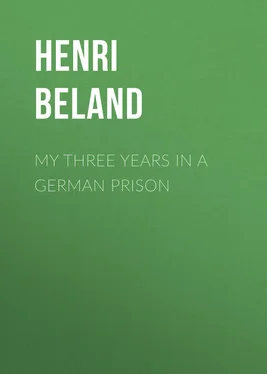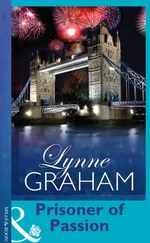Henri Beland - My Three Years in a German Prison
Здесь есть возможность читать онлайн «Henri Beland - My Three Years in a German Prison» — ознакомительный отрывок электронной книги совершенно бесплатно, а после прочтения отрывка купить полную версию. В некоторых случаях можно слушать аудио, скачать через торрент в формате fb2 и присутствует краткое содержание. Жанр: foreign_antique, foreign_prose, на английском языке. Описание произведения, (предисловие) а так же отзывы посетителей доступны на портале библиотеки ЛибКат.
- Название:My Three Years in a German Prison
- Автор:
- Жанр:
- Год:неизвестен
- ISBN:нет данных
- Рейтинг книги:4 / 5. Голосов: 1
-
Избранное:Добавить в избранное
- Отзывы:
-
Ваша оценка:
- 80
- 1
- 2
- 3
- 4
- 5
My Three Years in a German Prison: краткое содержание, описание и аннотация
Предлагаем к чтению аннотацию, описание, краткое содержание или предисловие (зависит от того, что написал сам автор книги «My Three Years in a German Prison»). Если вы не нашли необходимую информацию о книге — напишите в комментариях, мы постараемся отыскать её.
My Three Years in a German Prison — читать онлайн ознакомительный отрывок
Ниже представлен текст книги, разбитый по страницам. Система сохранения места последней прочитанной страницы, позволяет с удобством читать онлайн бесплатно книгу «My Three Years in a German Prison», без необходимости каждый раз заново искать на чём Вы остановились. Поставьте закладку, и сможете в любой момент перейти на страницу, на которой закончили чтение.
Интервал:
Закладка:
This officer remained with us for about three months, leaving at the end of December. I must acknowledge again that I never found in him the typical Prussian officer. This is easy to conceive when one recalls that for ten years immediately preceding he had lived in foreign countries, and associated with diplomats and attachés of embassies and legations of many countries. Naturally, he believed in the superiority of the German race. He boasted of German culture. He was convinced German industry was destined to monopolize the world’s markets. He insisted that France was degenerate, that Britain had not, and would never have, a powerful army, and said Dunkirk and Calais would surely be captured within a few weeks, etc., etc., etc.
During October and November of that year it was possible, although the frontier was guarded by German sentries, to cross into Holland on any pretext whatsoever. One might go there to buy provisions so long as the sentries were satisfied the party intended to return. It was only at Christmas, 1914, that the frontier between Antwerp and Holland was “hermetically closed”–if I may use this term. At the distance of about one kilometre from the frontier, a post of inspection and control was established. Here on Christmas Day the most absolute control of passports was ordered. No one could cross unless provided with a permit issued by the German administration in Antwerp. We were, therefore, at that time cut off from all communication with the outside world.
Winter had come; distress was great in Belgium, and but for the foodstuffs and clothing forwarded from the United States and Canada–but for the charitably disposed rich families, who can tell what horrors the population of the occupied territory would have gone through.
CHAPTER X
THE WORD OF A GERMAN
Towards the end of October, 1914, two or three weeks after the evacuation of the fortress of Antwerp, His Eminence Cardinal Mercier issued a pastoral letter to his clergy and people entreating the Belgians who took refuge in Holland during the terrible weeks of the bombardment of the northern region of Belgium to return to their homes.
This letter contained a special provision which is remembered to this day. The Cardinal stated that, after a conference with the German authorities, he was convinced the inhabitants of the Province of Antwerp would be exempt from all annoyances and would not be molested for any personal delinquency.
“The German authorities,” the Cardinal added, “affirm that in the event of any offence being committed against the occupying authority this authority will seek out the guilty party, but if the culprits be not found, the civil population need have no fears, as they would be spared.”
This was quite clear. The episcopal document was, of course, published in Holland and, consequently, many thousands of refugees returned to their homes in Belgium.
About the 15th of December of the same year–that is to say, about two months after the Cardinal’s letter appeared–two Capellen lads, 14 or 15 years of age, boarded a locomotive standing at the station, where it had been left by the engineer and fireman while they went to dinner. The boys amused themselves with the lever and soon had the engine running backwards and forwards alongside the station platform. Here they were caught by German soldiers who carried them off to Antwerp, where they were summarily tried, and sentenced to serve three weeks in jail.
The incident was considered closed; but not so, as we shall see. On the following day, Major Schulze, if I am not mistaken, the commanding officer at Capellen, requested the burgomaster to supply him with a list of twenty-four citizens, including the parish priest, the Rev. Father Vandenhout, and a former burgomaster, Mr. Geelhand. These twenty-four citizens, it was ordered, would be divided into groups of eight men each, and each group would, in turn, keep guard on the railroad every night from 6 o’clock until 7 o’clock the following morning, and this until further orders. This raised a hue and cry in the village. The citizens asserted, with reason, that the boys guilty of interfering with a locomotive had been caught; that the offence was not serious–was, in fact, nothing at all but the pranks of two boys. Everybody now recalled Cardinal Mercier’s letter, and the assurance upon which it was based, as given by the German authorities, namely, that no personal delinquency would be followed by reprisals against the civil population. What was to be done? Counsel was taken on all sides. The principal citizens met secretly and decided to submit the case to the Governor of Antwerp, General Von Huene.
But it was of no avail; the twenty-four citizens whose names appeared on the list were compelled to keep guard in front of the station during the cold, wet nights of December and January. On Christmas eve, the group to which the old priest, Father Vandenhout, belonged was on guard. This priest, about 70 years of age, and seven companions paced to and fro in front of the station, throughout a cold and stormy night. It was not until the 15th of January that an order from Antwerp ended this arbitrary ruling of the local military authorities.
It was at about that time that a new officer appeared at the chateau with a request that we should receive him in the house. This man was much less pleasant in manner than his predecessor. He had not lived in Spain or in Brazil. He had come straight from Eastern Prussia. He was violent and arrogant. He treated his orderly with extreme severity. The house trembled each time he started to scold the man, and this happened frequently enough. The officer left after a stay of three weeks, and God knows we never regretted his departure.
Once again we were free from the Germans’ presence. True, we could hear their heels tramping on the road outside, but under the domestic roof the family lived quietly in peace.
One of the Capellen physicians having returned from Holland, my wife and I decided, after consulting the children, to take steps to leave the occupied country, with the intention of crossing later to Canada.
CHAPTER XI
BRITISH CITIZENS
Early in February, 1915, my wife and I went to Antwerp, and called at the Central Office for the issuing of safe-conducts (passports). We submitted to the two officers in charge our request to be authorized to leave Belgium.
“Where do you wish to go?” inquired one of the officers.
“To Holland,” I replied.
“For what purpose?”
“In order to embark for America.”
“Why go to America?”
“Because I wish to return home to Canada, where I reside.”
“Then you are British subjects?”
“Yes.”
The officer appeared surprised. He turned to his comrade, and then looked at us, my wife and I, from head to foot.
“You are British subjects?” he repeated.
“You are right.”
“How long have you been in Belgium?”
“I came to Belgium before your arrival–that is to say, in July,” I replied.
“What are you doing here?” he inquired.
A colloquy between the two officers and ourselves followed for a few minutes, during which it was easily explained that my presence in Belgium had nothing mysterious about it, even from a German viewpoint.
Apparently convinced that he was not in the presence of a spy employed by the British Government, the first officer confessed that he could see no serious objection to the issue of a permit for our leaving Belgium, but he said that insofar as British subjects were concerned explicit instructions had been given, and he could not then give us the passport we requested without being first authorized to do so by the chief of the military police, Major Von Wilm. He advised us to see the major, and we proceeded to carry out the advice. On our way to the major’s office I remarked to my wife that it was quite possible I might never come out of this office, once inside. We went on, however. Major Von Wilm received us courteously, and listened attentively to our story.
Читать дальшеИнтервал:
Закладка:
Похожие книги на «My Three Years in a German Prison»
Представляем Вашему вниманию похожие книги на «My Three Years in a German Prison» списком для выбора. Мы отобрали схожую по названию и смыслу литературу в надежде предоставить читателям больше вариантов отыскать новые, интересные, ещё непрочитанные произведения.
Обсуждение, отзывы о книге «My Three Years in a German Prison» и просто собственные мнения читателей. Оставьте ваши комментарии, напишите, что Вы думаете о произведении, его смысле или главных героях. Укажите что конкретно понравилось, а что нет, и почему Вы так считаете.











